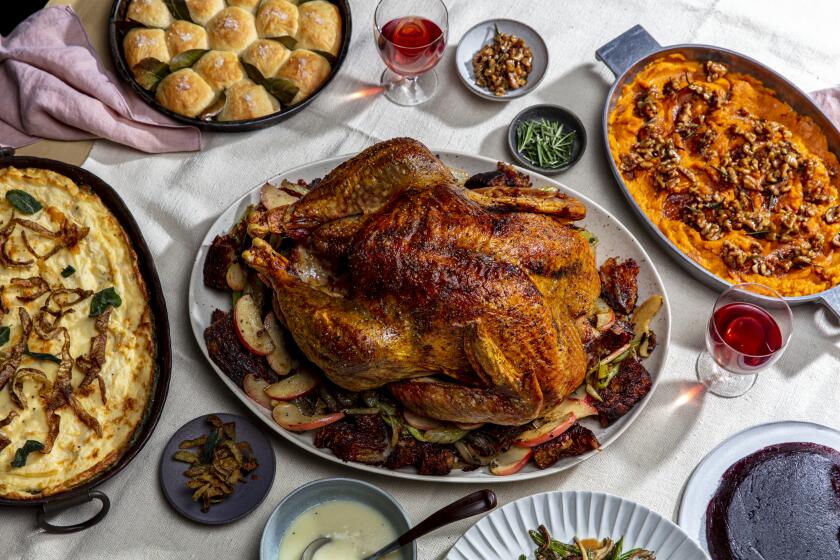New Restaurantâs Main Dish Is Hope
Their dream began with the soft, doughy mass of gorditas, deep-fried cornmeal stuffed with meat, and the spicy chile sauce of Maria Torresâ famous enchiladas.
Their determination took root during animated discussions in their cramped Boyle Heights apartments, where these women swapped stories of the forces beating down their Eastside barrio.
The community, they concluded, needed to be fed--and so did they.
Together, these comadres decided to mix the flavor of traditional Mexican cooking with the taste of economic hope--the perfect dish for a hungry neighborhood.
Last Friday, the unlikely entrepreneurs blinked back tears and suppressed their nervousness as they opened the doors to Jazmin Restaurante Familiar, an endeavor of 12 women who live in Eastside public housing projects.
The determined Boyle Heights residents have formed Cooperativa Paula Hernandez, a group named after a beloved local activist and dedicated to creating opportunities for the community.
Member Rosa Gonzalez said the fledgling restaurant, the first project of the cooperative, means just one thing: Esperanza. Hope.
With the heat of their own energy and scraps of funding, the women have cooked up what they hope will be a successful recipe.
âOur goal is to create jobs for the community and become authors of our own destiny,â said Torres, 42, whose tasty enchiladas are key ingredients in the new enterprise. These women have helped each other for as long as anyone can remember: Giving a little extra food when a neighbor was in need. Watching each otherâs children and passing along old clothes. Scolding young gang members lounging around the projects late at night. âAy mijo, go home!â they urge.
*
For the last decade, they have met once a week in small Bible-study sessions held in the Aliso Village, Pico-Aliso and Pico Gardens housing projects, looking for lessons on how to heal their community and help many of the single women struggling with poverty.
The problem, they decided, was that many women were stymied from finding jobs because of their lack of experience and limited English skills.
Juan Rodriguez, who directed the homeless outreach program at nearby Dolores Mission, ran many of the Bible studies and suggested that the women form a cooperative.
âFor years, the women in this community have given to the church and worked to protect the children,â said Rodriguez, 30, who now works as the cooperative organizer. âBut when they needed something, they were often forgotten. We saw a need for a project that would be for them, run by them.â
*
Behind this effort was the spirit of community volunteer Hernandez, who died of diabetes in February 1996. A tireless worker, she spent decades fighting poverty and crime in the area, friends said.
âShe fought injustice,â said Gonzalez, 56. âShe was the strength of the women here.â
âPaula always dreamed the community would open a restaurant, a project to help themselves,â Torres said. âI said, âAy comadre, wouldnât it be good to realize her dream?â â
With the help of Rodriguez, the women started a mini-restaurant in a little house on Gless Street. They crammed into a small, sweltering kitchen and served food to neighbors at three tiny tables on Fridays and Saturdays.
They started with dishes as familiar as the cornmeal dough they have been kneading for years: enchiladas, sopa de arroz, carne asada, mole verde and the ever-popular enchiladas and gorditas, stuffed with chicharon and chile, that went for $1 each.
Meanwhile, bolstered by a $50,000 grant from a national committee of the Presbyterian Church and driven by the memory of Hernandez, they worked for more than a year to find a site for a real restaurant.
The women sought donations of food and spent hours being trained to run a business. They swapped recipes and techniques (although Torres zealously guards the secret to her spicy enchiladas).
Now, they own and operate Jazmin Restaurante, a modest, one-room facility on 1st Street thatâs open every day from 7 a.m. to 9 p.m. The women take turns cooking in the kitchen, serving food and running the cash register. All work at least several eight-hour shifts a week, coming in at 6 a.m. to get the food ready for the day. Often, the late shift stays until midnight cleaning up.
Last Friday--opening day--was absolutely nerve-racking, the women said. The first customers were due at 6 p.m. By 5:30 p.m., the restaurant was still empty and Torres was looking anxiously out the window.
âBut then, all these groups of people starting coming,â she recounted, laughing. â âAy, ya vienen--Theyâre finally coming!â I yelled. We had to bring in more chairs to make room for all the people.â
Mariachis trumpeted joyful music and orders poured in. A priest from Dolores Mission blessed the establishment. People packed the small brown booths and the folding tables covered with plastic flowered tablecloths.
Behind the bar, a candle burned brightly in front of a large portrait of Hernandez, the restaurantâs inspiration.
The women were jubilant. But, they said, they realize that making Jazmin Restaurante a success will be a grueling uphill battle.
âIt will take a lot of sacrifices to make this work,â said Gonzalez, who works six days a week, 16 hours a day at the restaurant--and is paid for only half of her time.
Other women who work full time in factories volunteer hours on the weekend. Often, their daughters and granddaughters come in to help, running the cash register and serving food. Torres gave up her full-time job at a handbag factory in La Mirada to pitch in.
âI think the most important thing is Iâm putting part of myself into this project,â she said. âFor me, itâs a beautiful thing. This restaurant is a symbol of how I can lend a hand to people in my community.â
But more than that, Torres said, she owes these women.
âIâve learned a lot from my comadres,â she said. Torres, a single mother with six children between the ages of 6 and 21, said she would often grow impatient with them, yelling and scolding.
âBut I learned that children need love and teaching,â she said, her normally excited voice growing soft and somber. âMany of us, we donât know how to treat our children. These mujeres showed me.â
Eventually, the women hope to open other restaurants, giving more people a chance to work for themselves.
The cooperative members also want to launch a day-care center for young mothers, allowing teenagers to go back to school and get their diplomas.
âThere are so many young girls on the street,â Gonzalez said. âWe need to help them. Something bigger can come out of this, thatâs my dream. Itâs been my dream for a long time.â
More to Read
Eat your way across L.A.
Get our weekly Tasting Notes newsletter for reviews, news and more.
You may occasionally receive promotional content from the Los Angeles Times.










